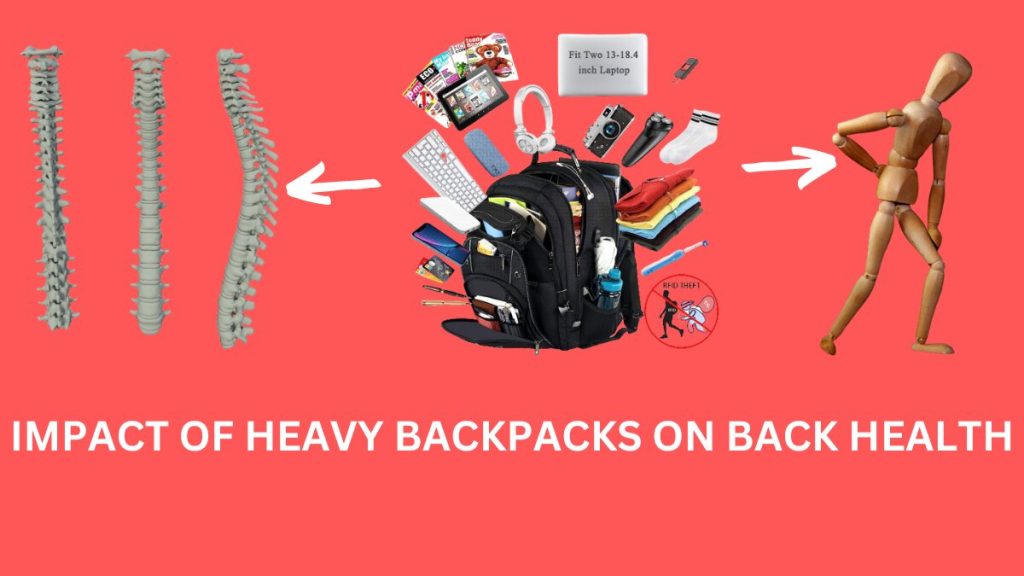In today’s fast-paced world, heavy backpacks have become a common sight among students, professionals, and travelers. While they serve as convenient carriers for our belongings, heavy backpacks can have detrimental effects on our health. In this comprehensive article, we will explore what types of medical problems can heavy backpacks cause. We’ll delve into the musculoskeletal issues, nerve compression, spinal misalignment, poor posture, and fatigue and muscle strain that can arise from the excessive weight and improper use of backpacks. Additionally, we will provide valuable insights into prevention and mitigation strategies to help individuals avoid these medical problems. So, let’s dive in and understand the impact of heavy backpacks on our well-being.
Understanding the Impact of Heavy Backpacks
Before we explore the specific medical problems, it is crucial to understand how heavy backpacks can affect our bodies. Carrying a backpack that exceeds a certain weight limit puts stress on various parts of our musculoskeletal system, leading to discomfort, pain, and potential long-term damage. The weight of the backpack can alter our posture, strain our muscles, and compress nerves, resulting in a range of medical issues.
what types of medical problems can heavy backpacks cause
1.Musculoskeletal Issues
Back Pain
One of the most prevalent medical problems associated with heavy backpacks is back pain. The excessive weight carried on our backs can strain the muscles, ligaments, and tendons in the back, leading to acute or chronic pain. Improper distribution of weight and lack of support from the backpack can exacerbate this issue.
Shoulder Pain
Heavy backpacks can also cause shoulder pain, especially when the load is unevenly distributed or when the straps are too tight. The weight pulling down on the shoulders can strain the muscles and joints, resulting in discomfort and reduced range of motion.
Neck Pain
The strain caused by heavy backpacks can extend to the neck area, leading to neck pain. Carrying a heavy load on the back can force the neck to tilt forward or to the side in order to maintain balance, placing additional stress on the cervical spine and causing pain and stiffness.
Voltaren Arthritis Pain Gel for Powerful Topical Arthritis Pain Relief

2. Nerve Compression
Tingling Sensation
When heavy backpacks put pressure on the nerves in the shoulders and upper back, it can lead to a tingling sensation known as paresthesia. This sensation occurs due to nerve compression and can be accompanied by numbness and weakness in the affected area.
Numbness
Nerve compression caused by heavy backpacks can also result in numbness, where individuals experience a loss of sensation in specific areas of the body. This can be a temporary symptom, but if left unaddressed, it can lead to long-term nerve damage.
3. Spinal Misalignment
Scoliosis
Carrying heavy backpacks consistently and with improper posture can contribute to the development or progression of scoliosis. Scoliosis is characterized by an abnormal sideways curvature of the spine, which can lead to pain, discomfort, and postural issues.
Kyphosis
Kyphosis, commonly known as hunchback, is another spinal misalignment that heavy backpacks can contribute to. The constant strain on the back and shoulders can cause the upper spine to round excessively, leading to an exaggerated forward curvature.
Lordosis
Lordosis refers to an excessive inward curvature of the lower back. Carrying heavy backpacks can contribute to this condition by causing the pelvis to tilt forward, increasing the natural arch in the lower back. This can result in lower back pain and discomfort.
4. Poor Posture
The weight and design of heavy backpacks can disrupt our natural posture, causing us to adopt unnatural positions to compensate for the load. Over time, this can lead to poor posture, with rounded shoulders, a forward head position, and an imbalanced alignment of the spine.
Fatigue and Muscle Strain
Carrying heavy backpacks for extended periods can lead to fatigue and muscle strain. The muscles in the back, shoulders, and neck are required to work harder to support the additional weight, leading to tiredness, soreness, and decreased performance.
Prevention and Mitigation Strategies
Now that we understand the potential medical problems caused by heavy backpacks, let’s explore some strategies to prevent and mitigate these issues.
Choosing the Right Backpack
To minimize the impact on your health, it’s essential to choose a backpack that is suitable for your needs. Opt for a lightweight backpack with padded shoulder straps, adjustable sternum straps, and a waist belt. Ensure the backpack has multiple compartments to distribute the weight evenly.
Proper Backpack Usage
Using a backpack correctly can significantly reduce the risk of medical problems. Adjust the shoulder straps so that the backpack sits snugly against your back and is centered. Avoid carrying excessive weight by regularly assessing and removing unnecessary items from your backpack.
Strengthening Exercises
Engaging in exercises that strengthen the muscles of the back, shoulders, and core can help you better handle the weight of a backpack. Focus on exercises that target these areas, such as rows, pull-ups, planks, and shoulder presses.
Taking Breaks and Lightening the Load
Taking regular breaks from carrying a heavy backpack can give your body the rest it needs. When possible, lighten the load by storing unnecessary items or using locker facilities. Distribute the weight evenly within the backpack to minimize strain on specific areas.
Frequently Asked Questions – medical problems with heavy backpacks
Conclusion – medical problems can heavy backpacks cause
Heavy backpacks can pose significant risks to our health, leading to a range of medical problems. The excessive weight and improper use of backpacks can result in musculoskeletal issues, nerve compression, spinal misalignment, poor posture, and fatigue. However, by implementing preventive measures such as choosing the right backpack, using it correctly, performing strengthening exercises, and taking regular breaks, individuals can minimize the impact on their health. Remember to listen to your body, make adjustments as needed, and prioritize your well-being over convenience. By doing so, you can enjoy the benefits of carrying a backpack without compromising your health.





